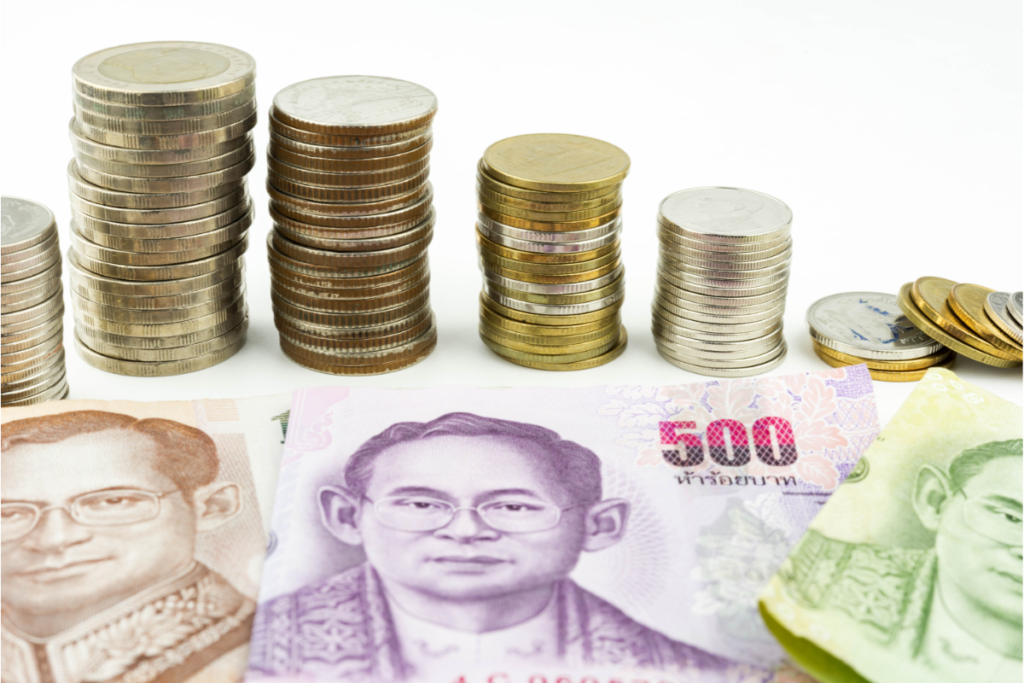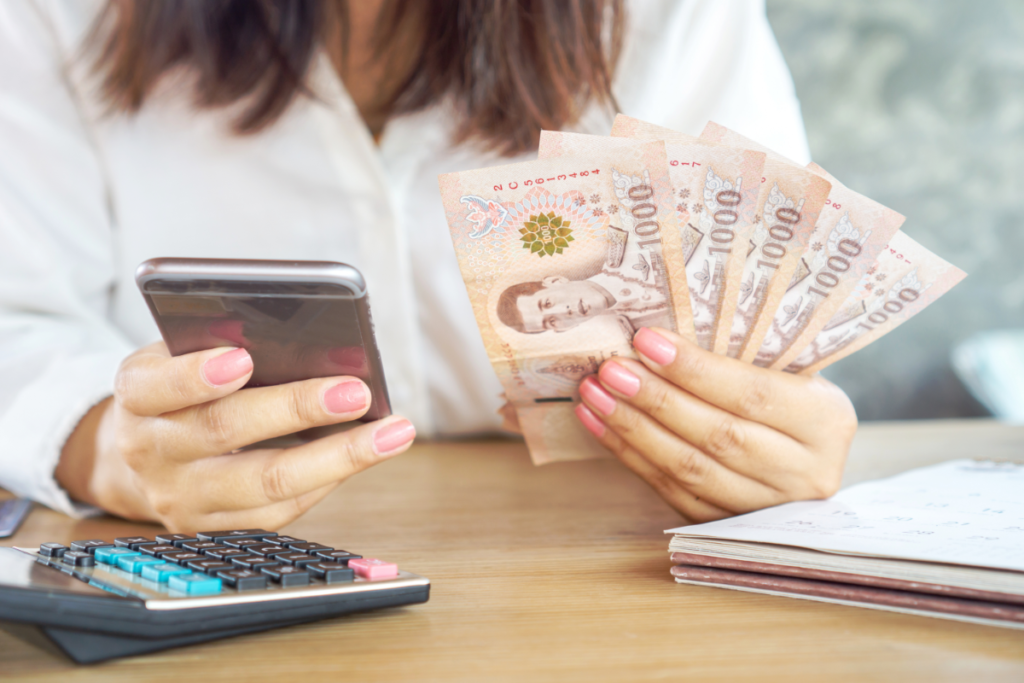Have you ever found yourself in a bustling Thai market, enchanted by the vibrant colors, aromatic street food, and the lively chatter of locals negotiating prices? Well, before you dive into the mesmerizing chaos of Thailand’s bustling markets or embark on a tuk-tuk adventure through its vibrant streets, there’s one thing you should have a grip on “Thai currency and money matters”.
So, what to know about Thai currency and money matters when traveling? It is not just a logistical detail; it’s your passport to navigating the Land of Smiles seamlessly. Whether you’re eyeing the street food stalls, exploring ancient temples, or haggling for treasures in the markets, understanding the ins and outs of the Thai Baht and the local financial landscape is the key to unlocking an unforgettable travel experience.
So, let’s embark on a journey through the world of Thai currency, where every Baht tells a story and every coin carries a cultural note.
Understanding Thai Currency: Baht and Satang

When traveling to Thailand, it’s essential to understand the local currency to ensure smooth financial transactions. The official currency of Thailand is the Baht, divided into 100 Satang. Familiarizing yourself with the different denominations of Baht and Satang will help you navigate currency exchanges and payments during your trip.
Baht coins come in various denominations, ranging from 25 Satang to 10 Baht. These coins are commonly used for smaller purchases and convenient for daily expenses. You’ll find them in circulation, with each coin featuring unique designs and sizes. On the other hand, Baht bills are available in different sizes and colors. The bills include 20, 50, 100, 500, and 1000 Baht denominations, each easily distinguishable from the others.
To avoid confusion and ensure accurate transactions, take the time to familiarize yourself with the specific values of each Baht denomination. This will make it easier for you to pay for goods and services and prevent any misunderstandings or potential overcharges.
Remember, having a good understanding of Thai currency, including Baht and Satang, will help you navigate the financial aspects of your trip with confidence and ease. Whether you’re making purchases, exchanging money, or simply budgeting your expenses, being familiar with the different denominations of Baht and Satang is an essential part of your travel preparation.
Which Currency Is the Best One to Use in Thailand?
One of the first considerations when planning your trip to Thailand is which currency to use during your stay. While Thai Baht is the official currency, a few currency options are available to you. Here are some factors to consider when deciding on the best currency for your trip:
Convenience and Acceptance:
- Thai Baht: Carrying Thai Baht is the most convenient option as it is accepted everywhere in the country. You won’t have to worry about finding exchange shops or dealing with currency conversion.
- US Dollars: While some establishments in popular tourist areas may accept US dollars, it is not widely accepted across Thailand. You may need to convert your US dollars to Thai Baht, which can incur additional charges.
- Indian Rupees: Using Indian Rupees in Thailand is not recommended as finding currency exchange shops that accept them may be challenging. Converting INR to Thai Baht before your trip is a better option.
Conversion Charges:
When deciding on the currency to use in Thailand, it’s important to consider the conversion charges. Converting currency in Thailand, especially in tourist areas, can come with higher fees compared to exchanging currency in your home country. It is advisable to exchange your currency for Thai Baht before your trip to avoid these additional charges.
Overall, carrying Thai Baht is the most convenient and cost-effective option for your trip to Thailand. It ensures that you have the local currency readily available and eliminates the need for multiple currency conversions.
What to Know about Thai Currency and Money Matters When Traveling

When planning your trip to Thailand, consider whether to carry US dollars as your currency of choice or carry a Thai Baht. Let’s explore your options below.
💸Carrying US dollars to Thailand
While carrying US dollars is an option, there are a few things to keep in mind. Firstly, not all places in Thailand accept US dollars as a form of payment. You might have to convert your dollars into Thai Baht, which can incur additional currency conversion charges. It is worth considering whether the convenience of carrying US dollars outweighs the potential extra expenses.
Another aspect to consider is the exchange rate. Converting Indian Rupees to US dollars in India may offer better rates compared to converting them into Thai Baht in Thailand. By exchanging your currency before your trip, you can potentially save on conversion charges and have the local currency readily available for your expenses in Thailand.
Overall, while carrying US dollars to Thailand is an option, there may be more convenient and cost-effective choices. It is advisable to assess your individual travel needs and priorities and weigh the pros and cons of carrying US dollars versus other currency options.
💸Carry Thai Baht to Thailand
One of the best options for using currency in Thailand is to carry Thai Baht. Thai Baht is widely accepted throughout the country, making it convenient for your day-to-day transactions. By exchanging your Indian Rupees (INR) for Thai Baht (THB) before your trip, you can ensure that you have the local currency readily available.
Exchanging currency through reputable platforms like BookMyForex can help you get the best exchange rates for your INR to THB conversion. It is advisable to compare exchange rates and fees across multiple platforms to make an informed decision. By doing so, you can maximize the value of your money and avoid unnecessary charges.
Benefits of carrying Thai Baht:
- Wide acceptance: Thai Baht is accepted at all major establishments, including hotels, restaurants, and shops.
- Convenience: Having Thai Baht in your wallet ensures that you don’t have to worry about finding currency exchange shops or dealing with conversion charges on a daily basis.
- Cost savings: By exchanging your INR to THB in advance, you can potentially save on conversion charges compared to exchanging INR to THB in Thailand.
Remember to carry smaller denominations of Thai Baht for day-to-day expenses and keep larger notes in a safe place. It is also advisable to inform your bank about your travel plans to avoid any issues with using your debit or credit cards in Thailand. Having Thai Baht in hand gives you peace of mind and ensures a hassle-free experience during your trip.
Currency Exchange Shops in Thailand: Converting INR to THB
If you’re planning to carry Indian Rupees (INR) to Thailand and convert them there, it’s important to be aware of the currency exchange shops available. While this can be a convenient option, it’s worth noting that currency exchange shops in Thailand often offer unfavorable rates, especially in popular tourist areas.
These shops may charge higher conversion fees and provide lower exchange rates, resulting in you receiving less Thai Baht (THB) for your INR. As a result, you may end up paying more for the conversion than if you had exchanged your INR to THB in India before your trip.
To avoid paying higher conversion charges, exchanging your currency before traveling to Thailand is recommended. By doing so, you can ensure that you have the local currency readily available and avoid the hassle of searching for favorable currency exchange rates.
Using ATMs and Banking in Thailand
When it comes to accessing cash in Thailand, using ATMs is a convenient option for travelers. Thailand has a widespread network of ATMs that accept foreign cards, making it easy to withdraw cash in the local currency. However, it’s important to be aware of potential fees associated with ATM withdrawals.
ATMs in Thailand often charge high withdrawal fees, which can significantly add up if you need to make multiple withdrawals. To avoid excessive fees, it’s advisable to withdraw larger amounts of cash less frequently. This way, you can minimize the number of withdrawals and save on fees.
When using credit cards in Thailand, it’s essential to inform your bank about your travel plans before you leave. This will help prevent any issues with card usage and ensure seamless transactions during your trip. It’s important to note that using credit cards in Thailand may come with additional charges, including international transaction fees, exchange rate margins, and ATM fees. In order to avoid any surprises, it’s recommended to familiarize yourself with your bank’s policies and fees before using your credit card.
Here are some tips for using ATMs and banking in Thailand:
- Inform your bank about your travel plans to avoid any card issues.
- Withdraw larger amounts of cash at once to minimize withdrawal fees.
- Check with your bank about any international transaction fees or exchange rate margins.
- Be mindful of your surroundings when using ATMs to ensure your safety and security.
By following these tips, you can make the most of ATMs and banking services in Thailand while minimizing fees and ensuring a smooth financial experience during your travels.
Cash vs. Card: Pros and Cons

When it comes to managing your money in Thailand, you have the option to use cash or cards. Each method has its advantages and considerations, so it’s important to understand the pros and cons before deciding.
➤Advantages of Cash:
- Convenience: Cash provides a sense of convenience, especially when you’re dealing with small businesses, street vendors, or markets that may not accept cards.
- Budgeting: Paying with cash allows you to have a tangible sense of how much you’re spending, making it easier to stick to your budget.
- Acceptance: Cash is universally accepted in Thailand, making it a reliable and hassle-free option for transactions.
➤Benefits of Using Cards:
- Security: Cards provide a higher security level than carrying large amounts of cash. If your card is lost or stolen, you can easily report it and prevent fraudulent transactions.
- Convenience: Using cards allows for quick and seamless transactions, especially at larger establishments and hotels that accept international cards.
- Expense Tracking: Card transactions are automatically recorded, making tracking your expenses and managing your finances easier.
It’s important to note that using cards in Thailand may come with some considerations. While major cards like Visa and Mastercard are widely accepted, smaller businesses and local establishments may prefer cash. Additionally, using cards internationally may incur foreign transaction fees and cross-currency charges. Therefore, it’s advisable to carry a combination of cash and cards to enjoy the benefits of both options.
Cash offers convenience and widespread acceptance, while cards provide security and ease of use. Consider your priorities, such as convenience, security, and expense tracking, when deciding which method to rely on during your trip to Thailand. By choosing the right mix of cash and cards, you can make the most of your travel experience without compromising your financial needs.
Important Etiquette and Customs Regarding Money in Thailand
When it comes to money in Thailand, it’s essential to be aware of the cultural customs and etiquette surrounding its handling. Showing respect for money and the local currency is highly valued in Thai culture, so exercising discretion and sensitivity in your interactions is important. Here are some important customs to keep in mind:
❗Don’t Touch Thai Banknotes
In Thailand, touching or stepping on Thai banknotes is considered disrespectful. This is because Thai banknotes feature the portrait of the revered Thai King. To show respect, handle banknotes with care and avoid any actions that may be seen as disrespectful.
❗Exercise Discretion with Money
In Thai culture, flaunting large sums of cash in public is considered impolite. It’s best to handle money discreetly and avoid unnecessary displays of wealth. When paying for purchases or tipping, use polite gestures and treat money with respect.
❗Be Mindful of Discussions About Money
In Thai culture, openly discussing money matters is seen as vulgar. Avoid engaging in conversations about personal finances or income levels, as it may be seen as inappropriate. Instead, focus on your trip’s positive experiences and Thailand’s cultural richness.
By following these customs and showing respect for Thai culture, you can ensure a positive and respectful interaction with money during your time in Thailand.
Safety and Security Considerations

When traveling to Thailand, it is important to prioritize the safety and security of your cash and valuables. Here are some essential tips to help you prevent theft and ensure a worry-free experience:
- Use anti-theft bags: Invest in slash-proof bags or hidden pocket bags to keep your money and valuables safe. These specialized bags add an extra layer of security and make it difficult for thieves to access your belongings.
- Avoid carrying large amounts of cash: While it’s essential to have enough cash for your needs, carrying excessive amounts can make you a target for theft. Keep a reasonable amount of cash with you and consider using other payment methods, such as cards or digital wallets, for larger purchases.
- Be cautious of your surroundings: Always be aware of your surroundings, especially in crowded tourist areas or public transportation. Keep an eye out for any suspicious activities or individuals and trust your instincts. If something feels off, moving to a more secure location is best.
- Secure your belongings: Keep your bags, wallets, and other belongings securely fastened and within sight. Avoid leaving your belongings unattended, even for a short period, and consider using locking mechanisms or travel locks to add an extra layer of protection.
- Stay discreet: Avoid drawing unnecessary attention to yourself by displaying large sums of money or valuable items openly. Keep your cash and valuables concealed and avoid discussing your finances or personal belongings in public.
By following these safety tips, you can minimize the risk of theft or loss during your trip to Thailand. Remember, it’s always better to be proactive and take precautions to ensure a secure and enjoyable experience.
Frequently Asked Questions
What is the currency used in Thailand?
Thai Baht is the official currency of Thailand. You’ll see it abbreviated as THB. Familiarize yourself with the currency symbol (฿) to identify prices easily.
Should I exchange money before arriving in Thailand or use ATMs there?
It’s generally more convenient to withdraw Thai Baht from ATMs in Thailand. The rates are competitive, and ATMs are widely available. Just keep an eye on any withdrawal fees your bank may charge.
Are credit cards widely accepted in Thailand?
In urban areas and tourist spots, yes. However, carrying some cash for small purchases and in more remote areas where card acceptance may be limited is advisable.
Can I use foreign currency for transactions?
It’s better to use Thai Baht for transactions. While some tourist places may accept foreign currencies, the exchange rates may not be favorable. It’s more cost-effective to use local currency.
How much cash should I carry for a day in Thailand?
It varies based on your spending habits, but having around 1,000 to 2,000 Baht per day for meals, transportation, and small expenses is a good starting point. Carry more if you plan on shopping or visiting high-end establishments.
Are there any currency regulations I should be aware of?
Thailand doesn’t have strict currency regulations for tourists. You can bring in unlimited foreign currency, but amounts exceeding $20,000 USD or their equivalent must be declared upon arrival.
Final Words
In a nutshell, delving into the intricacies of Thai currency and money matters before your journey is like having a trusty compass for your adventures. From understanding the colorful array of Baht denominations to navigating the ins and outs of currency exchange, this financial roadmap ensures that your Thai escapade is both culturally enriching and financially savvy. So, as you embark on the bustling streets of Bangkok or the serene beaches of Phuket, let your knowledge of Thai currency be your travel sidekick.
Whether it’s the jingle of coins in a street market or the ease of using a local ATM, each monetary interaction becomes a part of your journey’s narrative. By being well-versed in the nuances of Thai money matters, you’re not just a tourist but a savvy explorer, seamlessly blending into the rhythm of this beautiful country.
